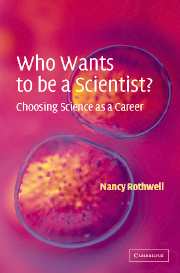Book contents
- Frontmatter
- Contents
- Preface
- 1 Introduction
- 2 Starting out in research
- 3 Getting down to research
- 4 Scientific ethics and conduct
- 5 Publish or perish?
- 6 Communication and getting known
- 7 Moving up
- 8 Responsibilities
- 9 Funding research
- 10 Who owns science?
- 11 Science and the public
- 12 Power, pressure and politics
- 13 Social aspects of science
- 14 So who does want to be a scientist?
- Index
13 - Social aspects of science
Published online by Cambridge University Press: 06 July 2010
- Frontmatter
- Contents
- Preface
- 1 Introduction
- 2 Starting out in research
- 3 Getting down to research
- 4 Scientific ethics and conduct
- 5 Publish or perish?
- 6 Communication and getting known
- 7 Moving up
- 8 Responsibilities
- 9 Funding research
- 10 Who owns science?
- 11 Science and the public
- 12 Power, pressure and politics
- 13 Social aspects of science
- 14 So who does want to be a scientist?
- Index
Summary
Hard luck on spouses?
To many people scientists are rather odd. Most of the population look forward to Friday evening – the end of the week – and dread Monday mornings, living in anticipation of the next holiday. Scientists tend to be rather different. They generally like going to work and consider themselves lucky to have a job which is so enjoyable. This is just as well, since success in science is rarely achieved by working from 9 a.m. to 5 p.m., for five days a week. There will be many times when it is necessary to work late into the evenings and at weekends, and to travel to meetings away from home. This of course brings problems for scientists and their families.
PARTNERS AND FAMILIES
The Nobel Prize winner Dorothy Hodgkin commented that one of the most important things for a scientist is to find is a sympathetic and understanding partner; someone who will put up with the many hours you will have to spend in the lab, working on a paper or popping into work at the weekends, which inevitably takes longer than planned; someone who is happy to plan the family holiday around international conferences, to read page after page of thesis or paper and hear talks being practised. There are many jobs that are demanding on time and effort. The competitive areas of business, finance, running your own company, all need commitment outside normal working hours, but in most cases the benefits for your family are a little more obvious. It is not surprising that many scientists partner other scientists who at least know (or should know) about the pressures of research.
- Type
- Chapter
- Information
- Who Wants to be a Scientist?Choosing Science as a Career, pp. 155 - 160Publisher: Cambridge University PressPrint publication year: 2002



